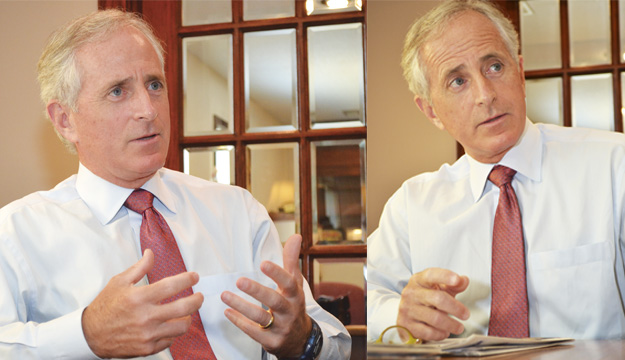By Scott Robertson
The tide of banking regulation that swept over America after the Great Recession of 2008 may finally have reached crest stage. You’ll forgive small community bankers, though, if they’re not celebrating. The floodwaters aren’t rising anymore, but the house is still under water.
When TriSummit Bancorp and HomeTrust Bancshares announced their merger Sept. 21 in Kingsport, TriSummit CEO Lynn Shipley pointed out the role over-regulation plays in making it hard for any community bank to do business. “The regulators won’t tell you, ‘You have to hire another person to handle this compliance matter,’” he said. “They’ll just say, ‘You have to handle this matter,’ and the way to do that is to hire another person, and of course, there’s a cost associated with that.”
That cost has become so large that even Congress may soon be willing to rein in the regulators. Competing bills made it through committees in both the House and Senate in the last year, but with presidential politics dominating the political landscape, none moved to the floor for a vote.
So how big does a problem have to be to get bipartisan agreement that it needs to be solved? Consider these statistics from the Community Banking Research and Policy Conference’s “Community Banking in the 21st Century” (CB21) report, issued Sept. 28.
• 42.64 percent: The mean percentage of community banks’ consulting and advisory spending that goes to regulatory compliance.
• 41.50 percent: The mean percentage of community banks’ auditing and accounting spending that goes to regulatory compliance.
• 20.68 percent: The mean percentage of community banks’ legal expenses that goes to regulatory compliance.
• 17.63 percent: The mean percentage of community banks’ data processing expense that goes to regulatory compliance.
• 11.40 percent: The mean percentage of personnel expenditure that goes to regulatory compliance.
One banker quoted in the CB21 report said, “It feels like we’re just a compliance shop that occasionally makes a loan.”
Bob Corker (R-Tenn.) sits on the Senate Banking, Housing and Urban Affairs Committee. He’s well aware of the costs bankers have had to deal with, and of the particularly deleterious effect of over-regulation on community banks.
“What you find in these cycles of extreme regulation,” Corker said in an Oct. 25 conversation with The Business Journal, “is that it benefits the larger institutions because through a large asset base, they have the ability to really spread the cost of compliance over a much larger portfolio. This has happened through time, when you go through really stringent regulatory times it benefits the larger entities.
“So what you see with community banks across our state is that though they have a much smaller asset base, they still have to have a back office capable of dealing with all the new regulations. So it ends up making them far less profitable, and they have much greater difficulty supporting growth in the communities they serve through lending and dealing with people they have in the past.
“It actually constrains their ability in a couple of ways,” Corker said. “You know, loans today have moved away from having anything to do with what you know about the customer. When I started back when I was 25 and had $8,000, it used to be about character, character, character. It’s no longer that way. So you’ve got two big problems. The asset base that community banks have is much smaller, but they still have to handle many of the same compliance issues, so the costs make them non-competitive. It also constrains them in their ability to lend. But in addition to that, the types of regulation, the boxes they have to check in many cases keep them from making credit available, period, to people they believe, under normal circumstances, should have credit available to them. That’s what we’re hearing across the state. I hear it non-stop and see it first-hand.”
The positive difference today is that, according to Corker, “There is, in fact, broad bipartisan support to enact regulatory reform. There really is.”
All things being equal, Corker said, the chances are better than 50/50 that some reform will come out of Washington within the next 365 days. “I believe the chances are more likely than less likely. I don’t want to be over – I have no idea what the environment is going to be like when we get back up there. But what I do know is we should have done it this last year. There’s enough that we agree upon. There’s tremendous agreement that small institutions in our country need relief, and providing that relief in no way creates significant risk to our country.”
That “significant risk” piece is what has held back bipartisan support until now. Democrats eager to be seen as protecting individuals from the big banks that started the recession in 2008 have been more likely to side against reform, even if it serves community banks, in favor of working through agencies like the Consumer Financial Protection Bureau (CFPB), the brainchild of Senator Elizabeth Warren (D-Mass.), directed by Richard Cordray.
Corker said though, that both sides of the aisle now understand they can help community banks without putting consumers at risk by deregulating the big banks whose problems spawned the outcry that gave rise to the CFPB.
“It’s not like you’re giving relief to the largest institutions,” Corker said. “You’re doing that for the smaller institutions. It doesn’t create risk for our country. It’s something that will promote growth in our country. There is enough bipartisan support for that.
“What happened over this last year is that there were things put in a package that couldn’t be agreed to by both Republicans and Democrats. My sense is the pressure is rising so much that we will at least get modest provisions done over this next year that I think at a minimum will help smaller institutions here in our country.”
Drilling down into the question of what reforms might actually be possible in the next 12 months, Corker said, “Well first, there’s a desire to allow a much longer exam cycle for community banks so they’re not hit quite as often with exams. I think what you’re going to see is that we’ll probably pass legislation this year where institutions under a certain size will have a significant lessening of compliance costs because we understand what that’s doing to communities across America.”
In addition, Corker said, portions of the Financial Regulatory Improvement Act of 2015 (also called the Shelby Bill) that passed the Senate Banking Committee a year-and-a-half ago by a vote of 12 to 10, are also likely to be included in legislation in 2017.
“For banks with under $2 billion in assets (for reference, TriSummit’s assets are in the $350 million range, while HomeTrust’s are around $3 billion) we would make it easier for them to qualify as rural lenders, which will have an effect on the QM or qualified mortgage rule.”
Why is that a big deal? Well, if a community bank originates a mortgage and keeps it on its own portfolio, rather than selling it to Fannie or Freddie, that mortgage will have QM liability protection.
Another easy reform to put in place would help banks eliminate both legal and mail expenses. “If a bank, for instance, doesn’t change their privacy notice mailings each year, then they wouldn’t have to mail out a new privacy notice to all their clients.” Such reforms might seem like common sense to some, but in this day and age, Corker said, they represent progress.
In the longer term, Corker said, reforming the CFPB will be important to managing regulatory risk to the industry. “The CFPB is continuing to create problems unnecessarily because you’ve got a sole commissioner in there instead of having a board of people like every other regulatory entity,” Corker said. “Addressing this one is more difficult because this is something that is not yet bipartisan, though there have been some court rulings recently challenging the way the CFPB is set up that will force us into a more bipartisan approach.
“From day one though, I have always thought and advocated for that consumer organization to have a board or commission where you don’t just have an autocrat making decisions and rulings solely based on what that one person believes,” Corker said. “That’s the way it is now set up.”
Corker has already attempted to move the CFPB off some of its more troublesome positions. In March, he sent a letter to Cordray expressing concerns that the CFPB was muddying waters it was supposed to clear. Particularly in the case of the Truth in Lending Act-Real Estate Settlement Procedures Act (TILA-RESPA) Integrated Disclosure (TRID) Rule, which was enacted in part to reduce consumer confusion, CFPB is increasing confusion.
“In a number of states including Tennessee,” Corker wrote to Cordray, “the actual amount customers will pay for title fees is prohibited from being disclosed under the Bureau’s rule. This has led to consumer confusion and has required additional disclosures to be provided to clarify the actual amount consumers will have to pay…What is the CFPB doing to address the borrower confusion?”
TILA-RESPA, TRID and Reg. Z are the bane of the community banker, according to the CB21 report. More than 23 percent of all community bank regulatory compliance expense goes to dealing with those regulations, which community bankers say slow the pace of business while increasing costs and liability.
What’s most telling about that, however, is not that the CFPB’s reading of those regulations is an annoyance to community bankers. It’s that community bankers have to make tough decisions based on those regulations, which again, were written to regulate much bigger banks.
When community bankers were asked in the CB21 data gathering what the top reasons they “exited an activity” were, the top answer was regulatory burden (36.87 percent). Profitability was cited at a 26.98 percent rate. That means community bankers made the decision to cease provision of a product or service more often because of regulatory forces than because of market conditions.
Even Washington can see that’s not a sound business model, Corker said. “On both the Republican and Democratic sides, there is an understanding that right now these regulations are crushing community banks. So yes, I do believe (regulatory reform) is going to occur.”






